The 7 Types of ADHD
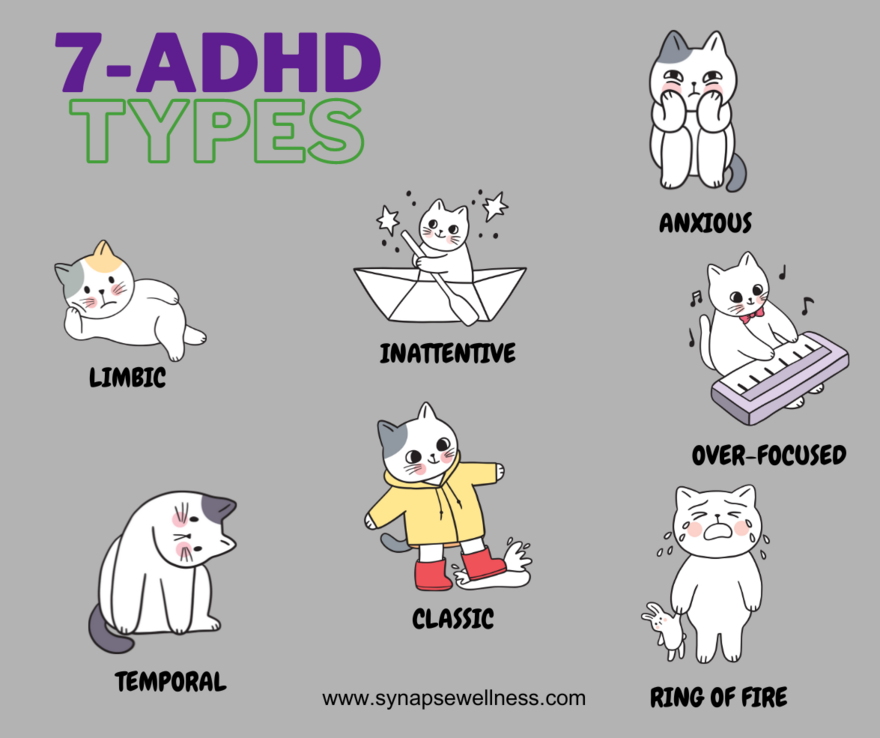
Did you know there are 7 different types of ADHD? If you struggle with ADHD you've probably noticed that you are not like others with ADHD...
As a clinician and coach who specializes in treating ADHD, I can tell you that everyone with ADHD is NOT THE SAME!
ADHD is a neurodevelopmental difference known for the challenges it causes with executive function, memory, impulse control. Overall the functions in the pre-frontal cortex of the brain.
There are many symptoms of ADHD but the most common ones are:
-
impulsivity
-
hyperactivity (restlessness)
-
inattention or hyperfocus
-
challenges with emotional regulation
-
challenges with organization, planning & time management.
In fact, most of my clients are QUITE DIFFERENT, yet the fall in a few different "categories."
In this post I will speak of the differences in ADHD from the perspective of the cognitive and emotional struggles that people with ADHD will experience, however there are also many GIFTS that come with having ADHD. I will do a separate series on the GIFTS & SUPERPOWERS OF ADHD at a later time.
You may have heard or read about the 7 types of ADHD or this may be the 1st time you are reading about it.
Technically, according to the Diagnostic and Statistical Manual V (DMV-V TR) there are just 3 types of ADHD:
-
Inattentive
-
Hyperactive
-
Combined
When ADD was switched to ADHD these sub-types were added to identify the particular struggle you had: inattention, hyperactivity or both.
The reality is that the DSM-V is not very descriptive and sadly many medical models don't really understand the diversity of ADHD. I love the term NEURODIVERSE because it illustrates the diversity in how we think, process, feel and act.
ADHD impacts many areas of functioning, from memory to organization, focus, and emotional regulation and many more in between. But the reality is that if I was to come up with a label I would probably say it's called:
"Attention & Hyperactivity Surplus" or "Neurodiverse Functioning".
The term "Disorder" implies that there is something really wrong with your brain.
The reality is that there is nothing wrong with your brain! It just functions in a much DIFFERENT WAY than how the world is set up, and how NEUROTYPICAL brains function.
Dr. Amen, who has been a pioneering psychiatrist studying ADHD and taking millions of brain scans of people with ADHD, has scientifically confirmed what I see in my practice. He was the first one to identify these 7 distinct types of ADHD.
There is A LOT MORE DIVERSITY IN HOW PEOPLE WITH ADHD PRESENT.
ADHD is commonly associated with varying levels of key neurotransmitters related to MOTIVATION & FOCUS.
Specifically:
-
DOPAMINE- Is thought of as the "reward" neurotransmitter in the brain and in charge of creating a "pleasurable" or "rewarding" experience.
-
This neurotransmitter makes executing ROUTINE everyday tasks challenging for children and adults with ADHD.
-
Yet often people with ADHD can also have the ability to HYPERFOCUS on areas of intense interest.
-
This is because pleasure, interest, and curiosity leads to the RELEASE OF DOPAMINE.
-
It is why people are often confused as to why they can focus so intensely on certain things, and struggle so much on other (more routine and mundane activities).
Understanding the Brain:
As mentioned, there are different areas that are impacted by ADHD, but these areas tend to be increased or decreased in each type.
-
Cerebral Cortex- This is the outer area of the brain and it's divided into 4 lobes:
-
Frontal Lobe: Pre-frontal Cortex
-
Regulates executive functioning
-
Attention
-
Decision making & reasoning
-
Planning
-
Emotional Regulation
-
Parietal Lobe:
-
Regulates touch & sensation
-
Spacial awareness & spacial orientation
-
Numbers
-
Occipital:
-
Regulates visual perception (you see with your brain)
-
Depth perception
-
Color & visual orientation
-
Temporal:
-
Auditory perception & processing
-
Visual Processing
-
Memory
-
Learning
-
Emotions
-
Language
-
Cerebellum
-
Regulates motor balance
-
Movement
-
Fine Motor Skills
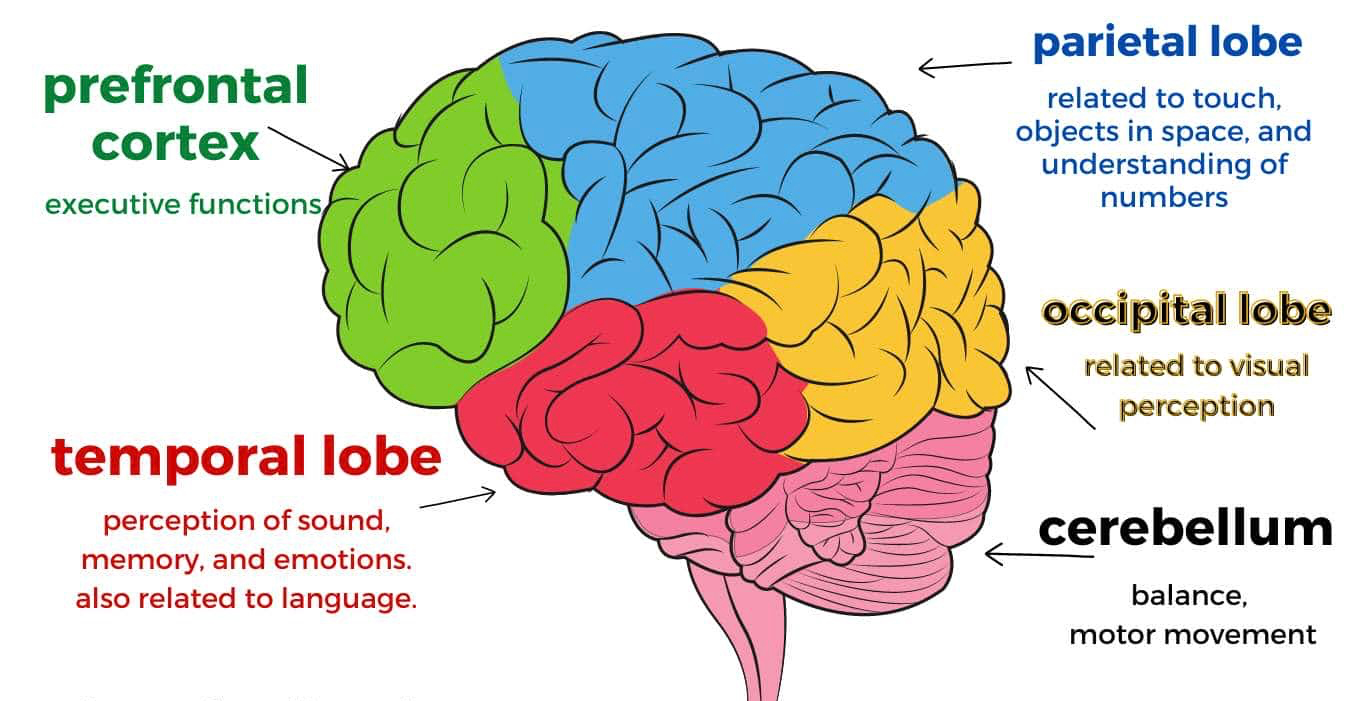
Through brain imaging and SPECT scans Dr. Amen ( A well renowned Psychiatrist who has specialized in ADHD) has identified 7 DISTINCT ADHD TYPES: (From his book "Healing ADD" by Dr. Amen)
-
TYPE 1: CLASSIC ADHD
Symptoms include:
-
Inattention
-
Distractibility
-
Hyperactivity
-
Impulsivity
-
Disorganization
-
Restlessness
These symptoms most closely resemble what the DSM-V terms "Combined ADHD", which includes the most 'classic' expression of ADHD. Bear in mind that ADHD impairments happen in a continuum so not everyone will have the same level of challenge in each of these things.
The AREA OF THE BRAIN most impacted by Type 1 is the:
-
PREFRONTAL CORTEX- responsible for sustaining attention and focus.

-
TYPE 2: INATTENTIVE ADHD
Symptoms include:
-
Inattention
-
Distractibility
-
Disorganization
-
Memory Impairments
These symptoms most closely resemble what the DSM-V terms "Inattentive ADHD"
-
Most people with this type, tend to be the last ones to be diagnosed because they are NOT trouble makers. They tend to be negatively labeled as "spacey, daydreamers or lazy" because they are often distracted by their own thoughts, or by external stimuli. Yet it's a more INTERNAL EXPERIENCE.

The AREA OF THE BRAIN MOST IMPACTED IN TYPE 2 IS:
-
PREFRONTAL CORTEX
As with Type 1 challenging tasks or tasks that require a great deal of concentration lead to a REDUCED blood flow to the pre-frontal cortex.
-
TYPE 3: OVERFOCUSED ADHD
Symptoms include:
-
Difficulty SHIFTING attention
-
Challenges with Flexible thinking- which leads to worry and obsession
-
Getting stuck in negative-thought loops
-
Negative perceptions & interpretations
-
Fault-finding
-
Oppositional
At times this type of ADHD can almost "appear" to be "opposite to adhd" as their ability to focus is extraordinary. You see the biggest problems when they are interrupted or asked to shift their focus, which can go from mild irritation to irascible behavior.
One of their compensatory strategies is EXTREME ORGANIZATION AND CREATING ROUTINES AND RITUALS- that they struggle moving or changing.
THE AREA OF THE BRAIN MOST IMPACTED BY TYPE 3 ADHD IS:
-
The Anterior Cingulate Gyrus- which is responsible for:
-
Attention-shifting
-
Flexibility
-
Error Detection
Because of the high level of activity in the Anterior Cingulate Gyrus, people notice EVERYTHING they hate about themselves and others, and can lead to very dangerous obsessions and behaviors like: OCD, ALCOHOLISM, EATING DISORDERS AND OTHER "COMPULSIONS".
They struggle with:
-
Letting things go
-
Forgiveness (they tend to hold grudges)
-
Have strong reactions to slight or perceived offenses
-
Highly emotional and frustrated when things don't go their way or things are changed at the last moment
-
Extreme rigidity
At times it may appear as "willful", disobedient, contrarian or rebellious. They need a lot of compassion and understanding and helping them PRACTICE shifting-attention, becoming more flexible and focusing on more positive parts of life experience.
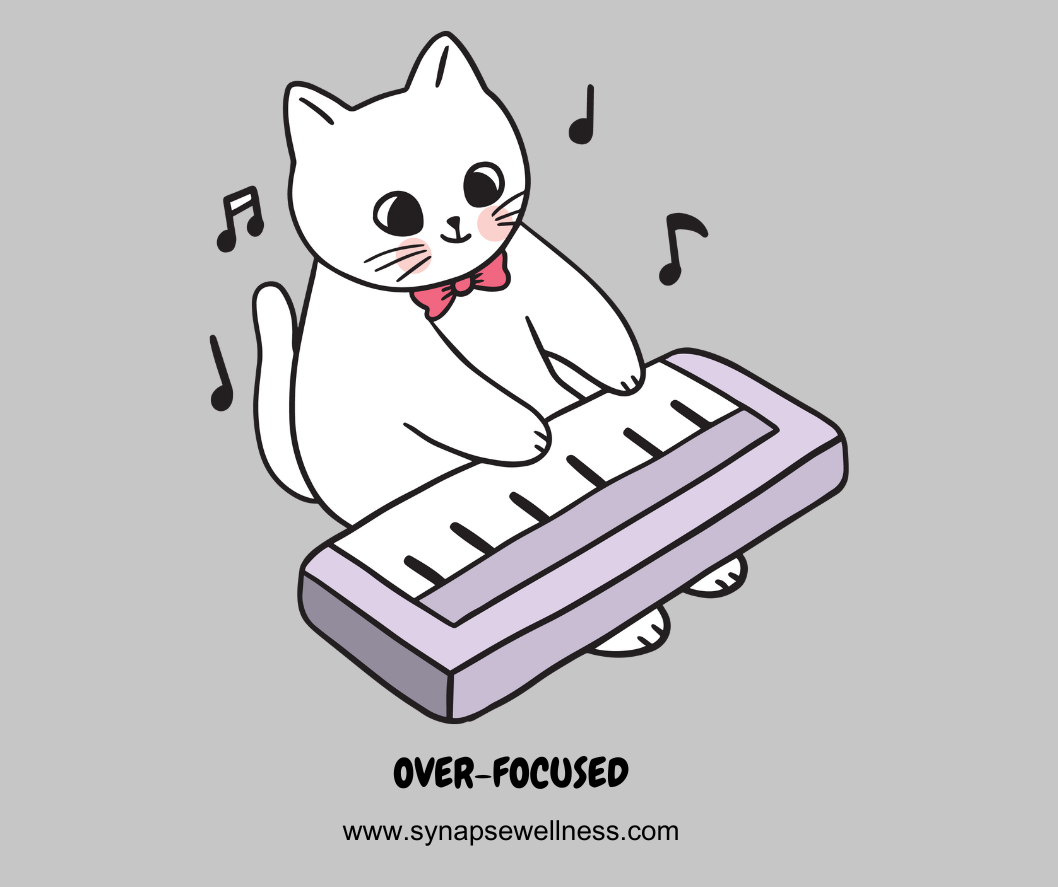
-
TYPE 4: TEMPORAL LOBE ADHD
Symptoms include:
-
Inattention
-
Distractibility
-
Disorganization
-
Mood lability
-
Memory
-
Irritability
This type is most often associated with co-morbid diagnosis of Learning Disabilities and Challenges in Cognition, Memory & Learning. They tend to have a slower Processing Speed and consequently need a bit more time to learn, understand and process things.
AREAS OF THE BRAIN MOST IMPACTED IN TYPE 4 ADHD:
-
Temporal Lobe:
Responsible for:
-
Learning
-
Memory
-
Emotional Regulation
-
Pre-frontal Cortex: (as above)
-
Cerebellum
-
Responsible for coordination
-
Movement
-
Balance
-
Posture
-
Gait
-
As well as spacial orientation (ability to judge distance between objects and self)
-
Basal Ganglia:
Responsible for:
-
Motor control- voluntary movements
-
Emotional regulation
-
Speech
This type struggles with school, learning, and tasks that require memorization, as well as in relationships because of their struggle with emotional regulation and (often as kids) behavioral problems. They are most likely to be labeled as "stupid" or "slow".
(Please note that I strongly disagree with any of these negative labels, yet many people with ADHD tend to struggle with labels such as "lazy, stupid or crazy", and I am simply pointing out the types of ADHD that may have that experience and why that is.)
It is my experience that most of the "memory" problems reported are due to several interrelated factors:
-
Negative beliefs
-
Lack of attention
-
Lack of interest
-
Failure to create meaningful associations between seemingly disparate information in a way that they can encode and retrieve easily.
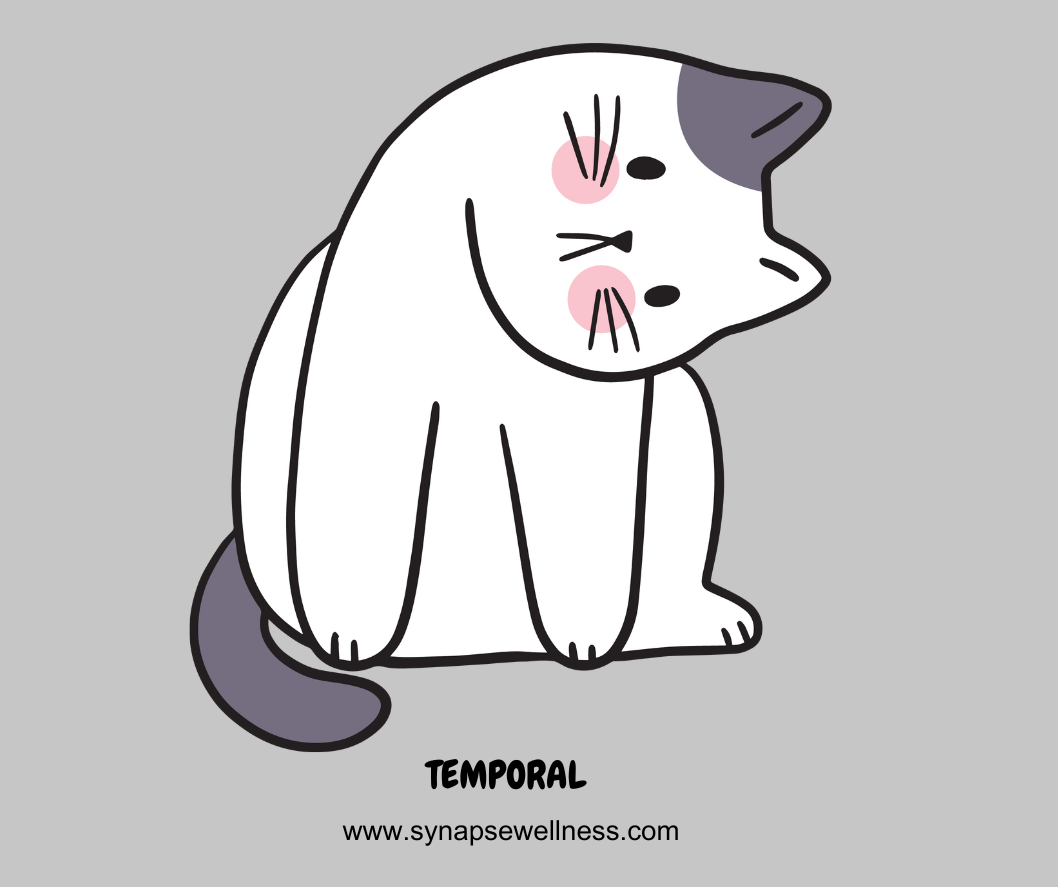
-
TYPE 5: LIMBIC ADHD
Symptoms include:
-
Inattention
-
Distraction
-
Disorganization
-
Low levels of Depression or dysthymia
-
Negative perception of Life
-
Low energy levels
-
Difficulties with Motivation and Initiation
Often people with Limbic ADHD will be diagnosed with Depression or Social Anxiety, and will not commonly be identified as having ADHD. Consequently they tend to struggle because the treatment of depression doesn't honor or understand the challenges of ADHD, and how they can generate greater frustration and overwhelm for the individual.
THE AREAS OF THE BRAIN MOST IMPACTED IN TYPE 5 ADHD IS:
-
Limbic System
When asked to engage in tasks that require high concentration, those with type 5 ADHD will experience a decreased activity in:
-
Pre-frontal cortex
-
Cerebellum
-
Basal Ganglia
Sadly this subtype of ADHD is most likely to be labeled as "lazy" or "anti-social" as they often struggle with low-energy, motivation and have difficulty in social situations.

-
TYPE 6: RING OF FIRE ADHD
Symptoms include:
-
Short attention span
-
Sensory challenges (or Hyper-sensitivity)
-
Highly distractible due to racing thoughts
-
Hyper-verbal
-
Impulsivity
-
Mood instability or Extreme Mood Lability
-
Conflict-driven behavior (seem to enjoy conflict)
-
Oppositional (Independent) Behavior (Struggle with direct requests or commands.)
-
Extreme Rejection Sensitivity
This type of ADHD is perhaps the MOST problematic, and most mis-understood due to the extreme lability and issues with mood regulation, rejection sensitivity and impulsivity.
Often they may be erroneously diagnosed as Bipolar, and the most likely to be labeled as "crazy" Dr. Amen has indicated that these symptoms often resemble Bipolar Disorder or Autism.
Finally in children it may also look like Oppositional Defiant Disorder.
The differential diagnoses in my opinion has to do with sleep. Although people with ADHD are capable of pulling "all-nighters" in an effort to finish a project, these instances are motivated by a desire/or pressure to finish a project or meet a deadline. And while their sleep may be disturbed in timelines, usually people with ADHD won't go without sleeping for days at a time.
Not being sleepy AND not being tired by the lack of sleep, for several days at a time is more of a symptom of bipolar disorder than ADHD.
It is also important to say that OFTEN people with Bipolar Disorder will ALSO exhibit symptoms and have similar executive function challenges as those with ADHD.
This is also the case with those diagnosed with Autism and Autism Spectrum Disorders.
This DOES NOT MEAN that if you have ADHD that you also would have bipolar or Autism, but that if you have bipolar or Autism is highly likely you will also have ADHD.
AREAS OF THE BRAIN MOST IMPACTED IN TYPE 6 ADHD:
This type has a pattern of OVER-ACTIVATION of the entire brain, including the FRONTAL LOBE as well as:
-
Cerebral Cortex
-
Pre-frontal Cortex
-
Temporal Lobes
-
Parietal Lobes
-
Cingulate Gyrus
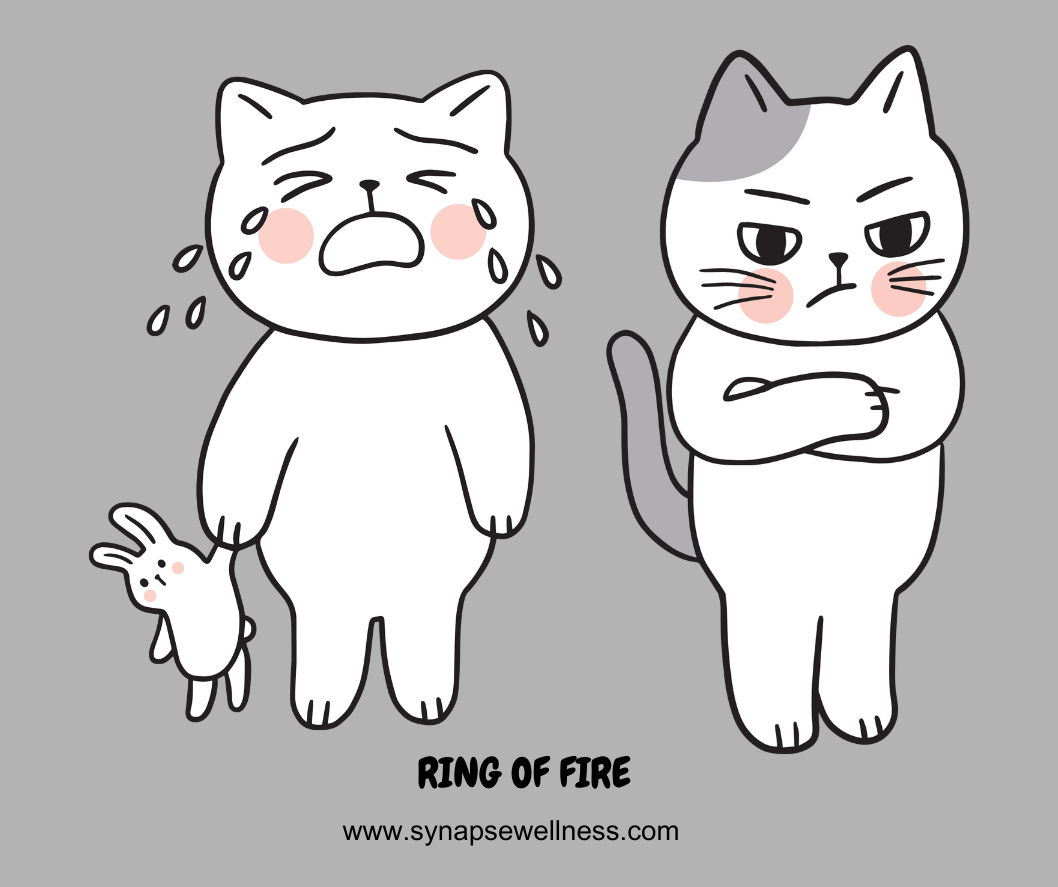
-
TYPE 7: ANXIOUS ADHD
This last type was the most recent addition to Dr. Amen's 7 Types of ADHD.
Symptoms include:
-
Inattention
-
Highly Distractible
-
Disorganized
-
Anxious & Nervous
-
Restless & Fidgety
-
Social Anxiety
-
Somatic Symptoms
-
Headaches, stomach aches, digestive issues, etc.
Children & Adults with this type often struggle with TIMED tests and other TIMED tasks, as well as PERFORMANCE EVALUATED tasks.
The anxiety tends to cause greater degrees of disorganization, overwhelm and emotional lability and decrease their capability to perform as they expect.
Type 7 often struggle in Social situations, as their fear of being judged tends to be intense. This can lead to further isolation.
They can be seen as "conflict-avoidant" as they fear negative appraisals from others, and perceived rejection or abandonment.
HOW CAN YOU USE THIS INFORMATION?
While this outlook has not been adopted by the DSM-V, it is based on years, and years of research and thousands of brain scans performed on people with ADHD. I believe Dr. Amen has done a tremendous job at advancing our understanding of ADHD and how it manifests differently for people, even if it has not yet been adopted by the DSM.
This understanding is HIGHLY VALUABLE as you consider your treatment options:
-
Medication- the different ways in which the brain is activated may help your doctor prescribe a medication that is best suited for you.
-
Treatment- Finding a provider that understands and knows how to approach each type of ADHD is crucial for you to get the best support. Some types will most likely need to have a therapist that helps them work on the EXTREME EMOTIONAL LABILITY and TRAUMA that has occurred as a result of having undiagnosed ADHD for a long time, as well as working with an ADHD coach.
-
Coaching- having a coach that understands each of these types is crucial in having someone help you develop skills in the specific area of deficit and the areas in which you struggle, while at the same time being able to help you connect with and embrace your gifts to bring a greater degree of confidence and competence to your life.
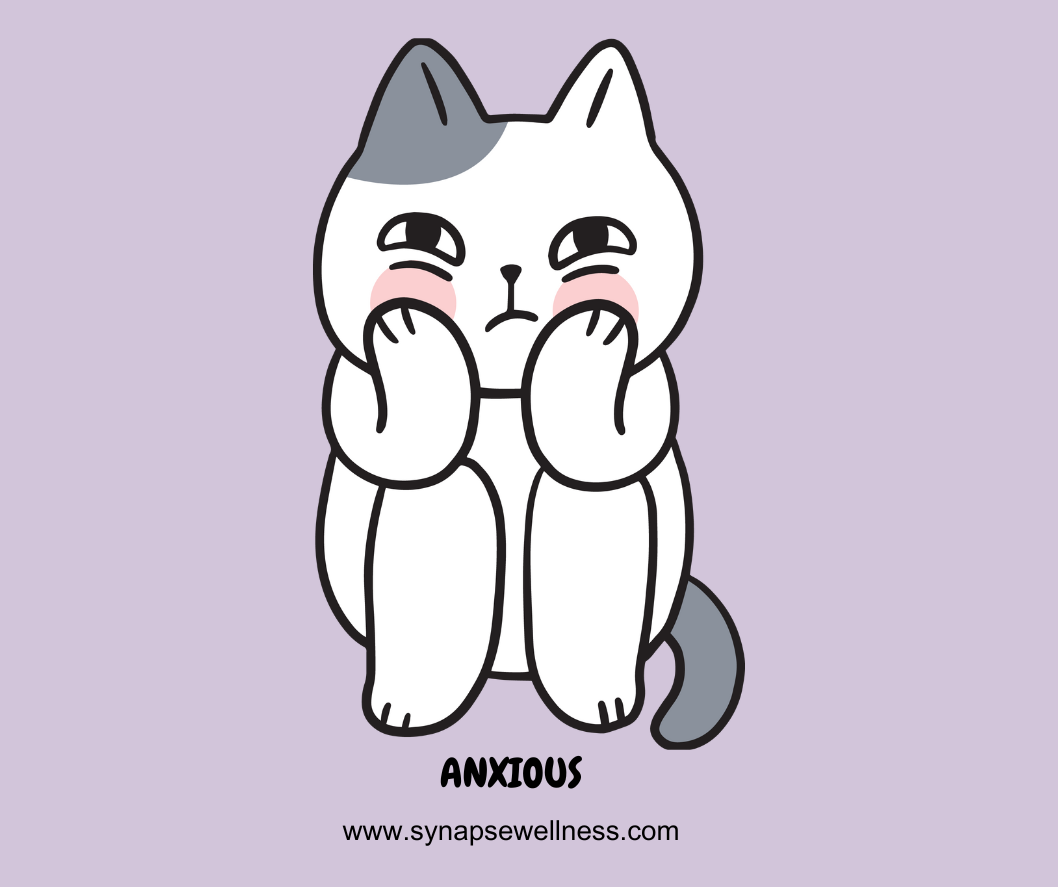
QUICK RECAP ON THE 7 TYPES OF ADHD:
-
Type 1: Classic
-
Type 2: Inattentive
-
Type 3: Over-focused
-
Type 4: Temporal
-
Type 5: Limbic
-
Type 6: Ring of Fire
-
Type 7: Anxious
Want to explore the other side of the coin?
Take this test to discover your ADHD SUPERHERO! (A fun way to identify your key strengths)
If you or someone you love are struggling with ADHD symptoms that are affecting your performance, your relationships, or your life reach out to us. We specialize in coaching people with ADHD in all its forms, and helping you learn how to LIVE & THRIVE WITH ADHD!
0 comments
Leave a comment